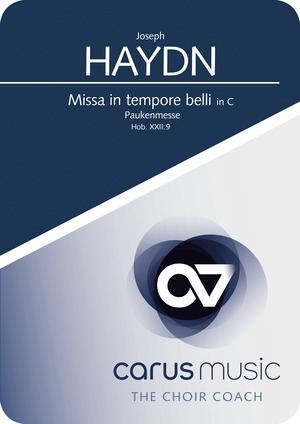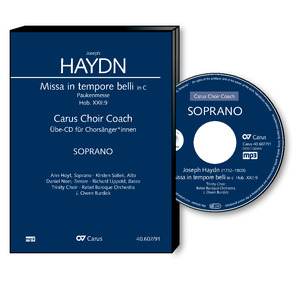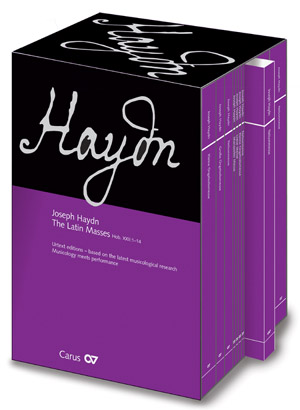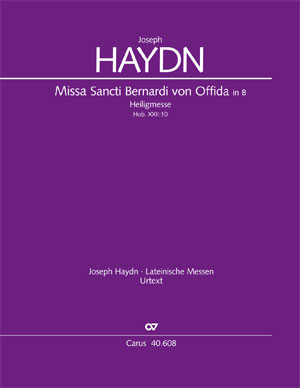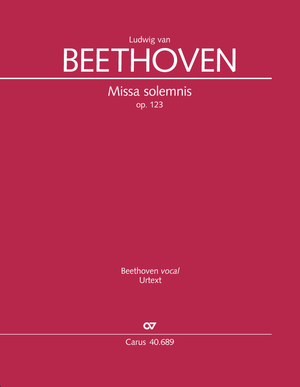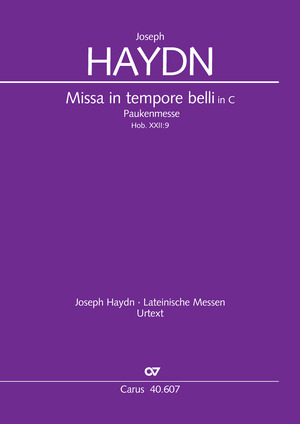
-
Composer
Joseph Haydn
| 1732-1809As Kapellmeister to Prince Esterházy, Haydn composed numerous instrumental works and various operas, as well as making important contributions to the genre of church music, including fourteen Latin masses, of which only twelve are authentic or complete; these are complemented by motets and offertories, two important Te Deum settings, two Salve Reginas, a Stabat Mater, and the different versions of the Sieben Worte des Erlösers am Kreuze. The masses were composed continually between 1749 and 1802, except for the years 1783–1795, and therefore constitute the genre with which Haydn was occupied over the longest period of time. The six (authentic or complete) masses composed before 1782 are stylistically very different, and as well as short Missae breves there are more extended masses with rich orchestral scoring; by contrast the six so-called late masses, written from 1796 onwards, form a comparatively homogeneous group of more extensive works scored for large forces. With his two great oratorios Die Schöpfung (The Creation) (1798) and Die Jahreszeiten (The Seasons) (1801) Haydn established the tradition of the German oratorio for middle-class music making. Personal details
-
Editor
Wolfgang Hochstein
| 1950
Reviews
Joseph Haydn: Missa in Tempore Belli
Joseph Haydn: Missa in Tempore Belli
Wieder einmal ist Wolfgang Hochstein für ein überaus instruktives Vorwort wie für einen akribisch genauen kritischen Bericht zu einem klassischen Chor- und Instrumentalwerk zu danken. Schon dieses rechtfertigt nahezu die Neuausgabe der „Paukenmesse” (nach der letzten Ausgabe im Zusammenhang mit der Gesamtausgabe 1958). Auch die Erweiterung durch die sonst nur separat mitgeteilten Klarinettenstimmen halte ich für wichtig. Das Entscheidende aber ist, dass man jetzt für Aufführungen nicht mehr auf schlecht zu lesendes Orchestermaterial, das zudem nur leihweise zu erhalten war, angewiesen ist. Auch braucht man jetzt nicht mehr zu entscheiden, entweder seinen Chor nach Chorstimmen singen oder teure Klavierauszüge kaufen zu lassen. Hoffentlich geht die Verlagsarbeit weiter in diese Richtung.
Quelle: Musica 3/95, S. 203
Haydn, Joseph (1732-1809): Missa in Tempore Belli
Erst vierzehn Jahren nach der „Mariazeller Messe” - bedingt durch die Josephinischen Reformen - schrieb Haydn 1796 wieder zwei große Messen, mit denen zugleich neben der „Schöpfung” und den „Jahreszeiten” durch die so genannten sechs großen und letzten Messvertonungen das kompositorische Spätwerk Haydns geprägt wurde. In der vorliegenden „Missa in tempore belli” hat die politische Situation mit ihrer akuten Kriegsgefahr deutlichen Niederschlag gefunden. Dabei spielen vor allem die Pauken und Trompeten im von dramatischen Kontrasten erfüllten Agnus Dei eine so bedeutende Rolle, dass sie der Messe zu ihrem bekannten Beinamen „Paukenmesse” verhalfen. Die Komposition stellt an alle Ausführenden sehr hohe Ansprüche und wird aufgrund ihrer zeitlichen Ausmaße eher in einem geistlichen Konzert als in unserer heutigen Liturgie ihren Platz finden. Für versierte Chöre ist dieses musikalisch ungemein beeindruckende Werk eine verlockende Herausforderung. Wer sich ihr stellen möchte, ist mit der vorliegenden Ausgabe des Carus-Verlages aufs Beste bedient!
Werner Schepp
Quelle: Musik im Bistum Essen 1996/I, S. 56f.
Sie ist die erste der sechs großen Messen, die Haydn zusammen mit der „Schöpfung” und den „Jahreszeiten” in fortgeschrittenem Alter schrieb, und die als Höhepunkt seiner Vokalkompositionen anzusehen sind. Die populäre „Paukenmesse” genannte Komposition ist zu Recht in Süddeutschland und Österreich auch in Friedenszeiten eine der am häufigsten innerhalb der Liturgie aufgeführten Messen. Die Neuausgabe des Carus-Verlages geht auf die verschiedenen Besetzungsmöglichkeiten des Orchesters ein (Klarinetten und Hörner sind „ad libitum” verzeichnet), die auf die unterschiedlichen Aufführungspraktiken in Wien und Eisenstadt zurückzuführen sind. Umfangreiches Aufführungsmaterial (einschließlich Chorpartitur) liegt vor, empfehlenswerte Ausgabe.
Gabriel Dessauer
Quelle: Katholische Kirchenmusik im Nationalsozialismus 1/1997 Teil II, S. 83
Frequent questions about this work
 There are no questions and answers available so far or you were unable to find an answer to your specific question about this work? Then click here and send your specific questions to our Customer Services!
There are no questions and answers available so far or you were unable to find an answer to your specific question about this work? Then click here and send your specific questions to our Customer Services!


